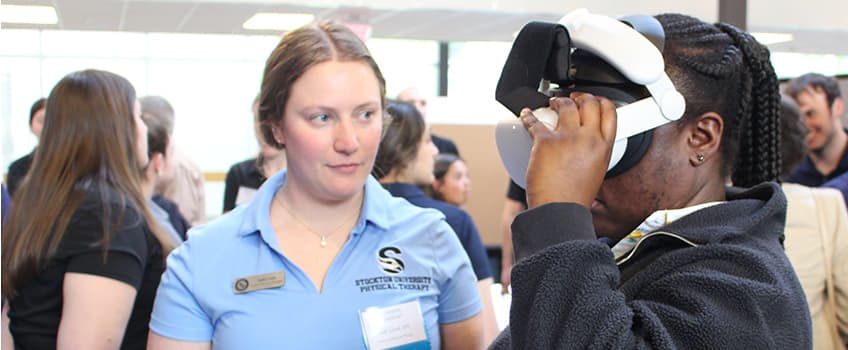Graduate Students Participate in Research Symposium

From left, Jodi Cook watches Danielle Lynch try on a virtual reality headset during the Graduate Research Symposium on April 25. Cook and Lynch were part of study with three other students titled 'Virtual Reality: The Future of Upper Extremity Stroke Rehabilitation.'
Galloway, N.J. — The university celebrated the accomplishments of its graduate students on April 25 with the annual Graduate Research Symposium.
Robert Gregg, the dean of the School of General Studies and Graduate Education, said the symposium in the C-D Atrium and nearby classrooms was the largest yet with about 100 students participating in about 60 presentations from 11 different majors.
The degree programs ranged from American Studies, Business Administration and Nursing to Coastal Zone Management, Criminal Justice and Social Work.
“Their projects signify their commitment to academic excellence, either through practitioner-based research or archival research,” Gregg said. “We celebrate the diversity and innovativeness of the research presented.”
Their projects signify their commitment to academic excellence, either through practitioner-based research or archival research. We celebrate the diversity and innovativeness of the research presented.”
“It showed overall that more research was needed,” said the Hamilton Township, Mercer County, native. “But I feel like this opened my eyes to stroke rehabilitation and working with patients with a neurological disfunction. That’s an area of PT that I really want to pursue.”
And despite the mixed results, Quick was grateful for going through the research process.
“It was definitely grueling to go through since scientific articles can get very deep with the details,” she said. “But it will make me more likely to go into research to find the newest, up-to-date information, so that way when I’m in the clinic, I know how to get it. I know how to read the research and how to use it.”
Learning how to do research was a big part of Sabrina Szatmari’s Master’s of Criminal Justice project on the fairly recent and controversial topic of ghost guns — unregulated and untraceable guns that can be bought online as a kit and assembled at home.
The Ventnor native admitted that before this year she didn’t really know much about ghost guns and wanted to learn more. She found there wasn’t a lot of research about them and decided to report on police officer perceptions of the guns and how they are affecting the community in Atlantic City and Atlantic and Camden counties.
“Any criminal justice job in the field revolves around research, so you need to be able to know how to analyze data, conduct a literature review and conduct basic research,” said Szatmari, who will graduate in May. “It’s important to know what’s out there and why you might experience on the job.”
Szatmari ’22 said she found graduate school “very challenging,” especially when compared to undergraduate, but she feels like Stockton has trained her well for her post-graduation job as a court services officer in the Ocean County Superior Court.
“It taught me a lot of valuable skills and also I’m going to need once I go out in the field,” she said. “All the professors were incredible, and they help us so much. I’m just excited to see what’s out there.”
— Story and photos by Mark Melhorn


